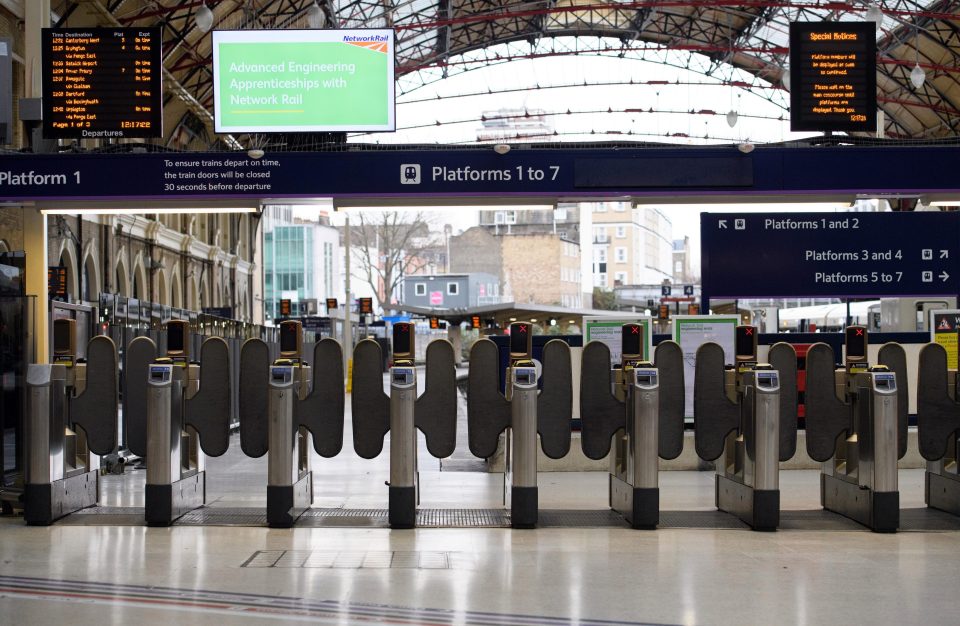Train fares to go up by 3.6% in January adding hundreds of pounds to the cost of season tickets
Rail users in the UK are braced for eye-watering fare rises next year

MILLIONS of rail commuters in the UK are braced for whopping fare rises of 3.6 per cent next year, adding hundreds of pounds to the cost of season tickets.
The annual increase in the cost of tickets comes into effect from January 2018 and marks the highest increase in fares in five years.
The rise is pegged against inflation, specifically the retail price index (RPI), and was announced by the Office for National Statistics this morning.
Regulated fares make up almost half of all tickets and include season tickets and standard returns.
Fewer than half – 47 per cent - of passengers are satisfied with the value for money of train tickets, according to the latest survey by passenger watchdog Transport Focus.
Last year, regulated fares rose by 1.9 per cent. While ticket prices have gone up by twice the rate of wages in the last six years.
Campaigners said commuters would be worst-hit and suggested that the RPI measure should be scrapped.
Stephen Joseph, chief executive at Campaign for Better Transport, called on the Government to use the Consumer Price Index (CPI) measure of inflation to set rail fares.
CPI is generally lower than RPI and is used to calculate changes in benefits.
Mr Joseph said: "This rise will be the highest since 2013, and will leave many commuters struggling to meet the cost of their commute next year.
Examples of annual season tickets at current prices include:
- Brighton to London £4,184
- Liverpool to Manchester £3,044
- Worcester to Birmingham £1,348
- Bath to Bristol £1,580
"Passengers would be forgiven for thinking they are being taken for a ride when RPI has been dropped as an official measure for most other things."
Andy McDonald MP, Labour’s Shadow Secretary of State Transport, said rail fare rises under Tories are "truly staggering".
Top 5 highest rises in cash terms
LABOUR compared costs on over 180 routes between when the Conservatives came to power and the projected new prices that will be implemented this January 2018.
New figures show:
- From January, some commuters will be paying over £2,500 more to travel to work than they were in 2010.
- The highest increase was on a Virgin Trains season ticket between Birmingham and London Euston which will have risen by £2,539 since 2010 and now costs £10,567.
- The biggest percentage increase identified was between Thame Bridge Parkway near Walsall and Nuneaton, where the cost of an annual season ticket will have risen by 48 per cent since 2010.
The ONS warned last month that RPI is "flawed" and has "serious shortcomings".
HIDDEN TRICKS How to avoid rail fare increases by splitting your tickets and finding hidden fares
But Paul Plummer, chief executive of the Rail Delivery Group – which brings together train companies and Network Rail to improve the railway – said money from fares pays to improve the railway, making journeys better and supporting communities across Britain.
He said: "Rail companies are working together to improve performance now, adding thousands more seats over the next 18 months and, longer term, simplifying fares and ticket buying so that the country has the railway it needs to prosper.”
Why trains fares are calculated using RPI measure and what is it?
TRAIN fares are caluclated using the RPI rate of inflation measure which is announced in August each year.
- The RPI (Retail Price Index) rate of inflation for July is used to determine how much train companies can raise the price of regulated rail fares.
- The Consumer Price Index (CPI) is typically lower than the RPI
- Research by Campaign for Better Transport previously found that replacing RPI rail fare rises with the much more widely used CPI would have helped tackle soaring ticket prices in recent years.
- Around half of regulated train tickets are regulated fares, these include season tickets
Read more on how cut your bills
We pay for your stories! Do you have a story for The Sun Online Money team? Email us at money@the-sun.co.uk or call 0207 78 24516













